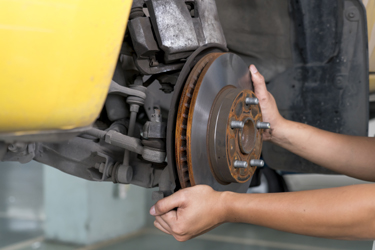Your car’s braking system is one of its most critical safety components. Keeping it in top condition ensures your vehicle can stop effectively and prevent accidents. Knowing the signs that your car needs brake repair can help you address issues before they become serious problems. Here are the key indicators that it’s time to get your brakes checked.

1. Squeaking or Squealing Noises
One of the most common signs of brake trouble is hearing squeaking or squealing noises when you apply the brakes. This sound often indicates that the brake pads have worn down and need to be replaced. Most brake pads have built-in wear indicators that make noise when it’s time for a replacement.
2. Grinding Sound
A grinding noise while braking is a serious issue. This typically means that the brake pads are completely worn out, and the metal components of the brakes are rubbing against each other. If you hear grinding, it’s crucial to get your brakes inspected immediately to avoid further damage and higher repair costs.
3. Reduced Responsiveness
If your brakes feel less responsive or the pedal sinks to the floor when you apply pressure, there could be a problem with the brake fluid or a leak in the braking system. This can significantly impair your ability to stop quickly, posing a severe safety risk.
4. Pulling to One Side
When your car pulls to one side while braking, it may indicate uneven brake pad wear, a stuck caliper, or a problem with the brake fluid. This can affect your control over the vehicle and should be checked by a mechanic as soon as possible.
5. Vibrations or Pulsations
If you feel vibrations or pulsations in the brake pedal or steering wheel when braking, it could be a sign of warped brake rotors. Warped rotors can occur due to excessive heat and stress. It’s important to address this issue to ensure smooth and effective braking.
6. Brake Warning Light
Modern cars are equipped with dashboard warning lights that alert you to potential issues. If the brake warning light illuminates, it could be due to low brake fluid levels, worn brake pads, or other braking system problems. Don’t ignore this warning; have your brakes inspected by a professional.
7. Burning Smell
A sharp, chemical odor coming from your wheels after heavy braking can indicate overheated brakes or a stuck caliper. Overheating can cause brake fluid to boil, reducing braking efficiency and potentially leading to brake failure. If you notice a burning smell, pull over safely and allow your brakes to cool down before continuing your journey.
8. Spongy or Soft Brake Pedal
A brake pedal that feels spongy or soft when pressed can signal air in the brake lines or a problem with the master cylinder. This reduces the effectiveness of your braking system and requires immediate attention to ensure your safety.
9. High-Pitched Screeching
Some brake pads are designed with a small metal strip that produces a high-pitched screech when the pads are almost worn out. This screeching sound acts as an audible alert that it’s time to replace the brake pads. Ignoring this sound can lead to more extensive damage.
10. Visible Wear and Tear
Regularly inspect your brake pads through the wheel spokes. If they appear thin (less than a quarter-inch), it’s time to replace them. Additionally, look for any visible cracks, grooves, or uneven wear on the rotors, which can also indicate a need for brake service.
Conclusion
Brakes are vital to your vehicle’s safety, and recognizing the signs of brake problems can prevent accidents and costly repairs. If you notice any of these symptoms, don’t delay—schedule a brake inspection with a qualified mechanic. Regular maintenance and prompt repairs ensure your brakes perform optimally, keeping you and others safe on the road.
Lim’s Auto Body is a full service auto body and mechanical repair shop locally owned and operated in Largo, Florida. For more information, go to our web site www.limsautobody.com or call (727) 422-3232.
